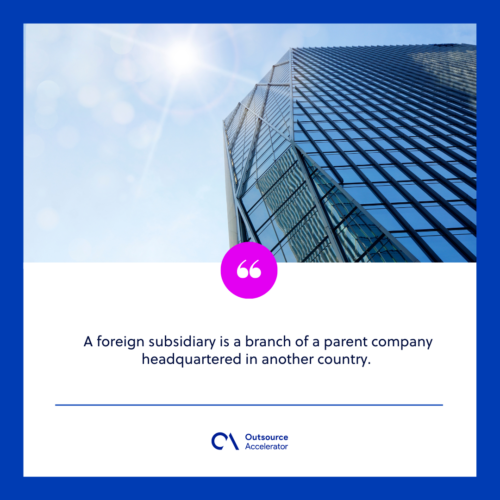Foreign subsidiary
Definition
What is a foreign subsidiary?
A foreign subsidiary is a branch of a parent company headquartered in another country. It is also known as a holding company.
When a firm has a foreign subsidiary, it has its own legal entity accountable for its assets and liabilities. However, the parent company is responsible for the tax and regulatory management of the subsidiary.
Legally distinct from their parent company, foreign subsidiaries are subject to the laws of the countries where they operate. Their assets and taxes belong to the country where they are based.

Advantages of establishing a foreign subsidiary
Having a foreign-owned subsidiary is advantageous since the parent business can still provide leadership, direction, and support to the subsidiary. Setting up a foreign subsidiary offers many advantages, including:
Share resources with the parent company
One of the best benefits of having a foreign subsidiary is that the parent company can share resources, which include financial systems, administrative services, and marketing functions.
An established foundation allows the subsidiary to grow efficiently rather than beginning from scratch.
Boost competence in the market
A parent firm can also use an established foreign subsidiary to diversify its customer base by expanding its reach into new markets. As a result, the host country’s economy will benefit, but so will the subsidiary’s ability to reach markets in neighboring countries.
Access assistive technology
Many foreign countries, particularly those in Asia, offer cutting-edge technology and software. Increasing the speed and agility of legal teams is possible through the use of new technologies. With this, foreign subsidiaries of multinational firms can construct a truly global workforce.
Expand growth opportunities
When the domestic market is overwhelmed with competition, entering a new country might promote increased business growth and revenue that would not have been achievable in the home country.

Disadvantages of a foreign subsidiary
Setting up a subsidiary in another country also has some disadvantages. These are not meant to deter companies from establishing foreign subsidiaries. Instead, being aware of these potential drawbacks helps you better prepare for the success of your business expansion.
Complicated requirements for obtaining a visa
Working in a foreign nation typically necessitates complicated immigration procedures. You and your employees may have difficulty obtaining a work visa. Also, approval and consideration by relevant authorities may take weeks or even months.
Adapting to the host country’s culture and politics
When a foreign entity wholly controls a corporation, it is a foreign-owned subsidiary. Consequently, there may be cultural and political issues that could harm the subsidiary’s success.
Complying with the country’s laws and rules
A major challenge in setting up a foreign subsidiary is ensuring that local rules and regulations are followed. Hiring employees, keeping track of payroll, paying taxes, and registering your business activities all include a slew of regulations that can be confusing.
Time-consuming and expensive
Many overseas corporations are hesitant to invest in establishing a subsidiary in another country because it takes time and money. Some countries and industries must have a large amount of paid-up capital.
Prohibition of foreign ownership
Specific industries in some nations are regulated, and foreign ownership is prohibited. There are some cases where no foreign request is allowed. However, the majority of the ownership must be held by locals, but a specific amount of the business can be owned by a foreign investor.







 Independent
Independent




